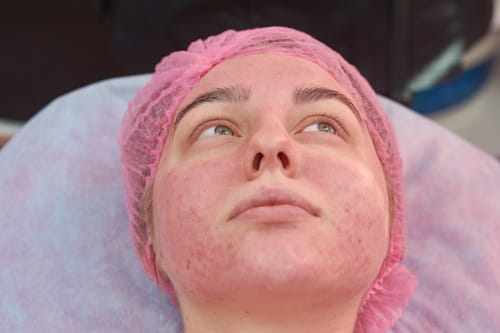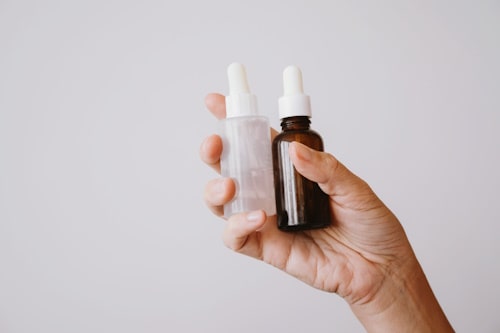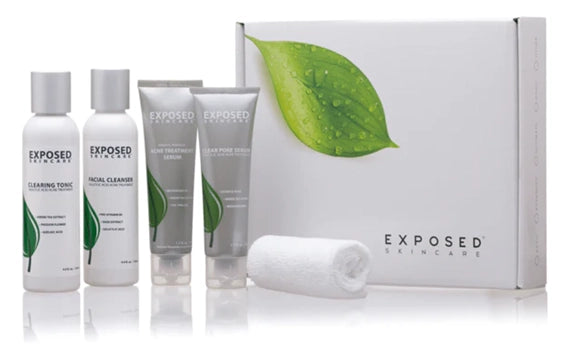Thyme has been making waves as an acne treatment alternative. Touted as a natural antibacterial and anti-inflammatory remedy, many claim that thyme can replace your standard anti-acne creams.
However, it's essential to look beyond the hype and understand the limitations of using thyme for acne treatment. This article will explore five reasons why thyme may not be the perfect solution for everyone dealing with acne-prone skin.
Also read: How to choose the best acne treatment
Biggest Take-Aways:
- Thyme's effectiveness as an acne treatment is still under scrutiny, with more research needed to confirm its benefits.
- Using thyme for acne can have potential side effects, such as skin irritation or allergic reactions.
- Scientifically proven ingredients like benzoyl peroxide remain more reliable for treating acne than thyme.
- Exposed Skin Care provides a comprehensive, scientifically-backed treatment for acne that is effective and gentle on the skin.

Reason 1: Lack of Comprehensive Studies on Effectiveness
Is Thyme Truly a Replacement for Benzoyl Peroxide?
Thyme, or Thymus vulgaris, has been celebrated for its antibacterial properties. Some new research even suggests it might have the potential to kill Propionibacterium acnes, the bacterium that causes acne.
However, most of these studies are not comprehensive enough to definitively state that thyme is a more effective treatment for acne than prescription creams like benzoyl peroxide. While thyme may have some antibacterial and anti-inflammatory properties, there is a lack of robust studies that explore the long-term effect of thyme on acne.
The constituent compounds from the plant that can kill acne-causing bacteria in a petri dish may not necessarily work on the skin in the same way. Further tests in conditions that mimic real-life situations are sorely needed. Until then, it's premature to label thyme as a proven acne treatment.
Reason 2: Potential for Skin Irritation
Not All Natural Alternatives Are Gentle
The word 'natural' often gives the impression of being gentle and less harsh on the skin, but that's not always the case. Thyme essential oil, in particular, can be a skin irritant. When applied to the skin, especially without proper dilution, it may cause a burning sensation or even exacerbate existing skin conditions.

Creams or tinctures that use thyme may also include other potent herbs like marigold and myrrh tinctures, which might not be suitable for everyone. Even steeping dried thyme in alcohol for days to make a homemade thyme tincture could lead to a treatment that's too potent and irritating for sensitive, acne-prone skin.
Reason 3: Complexity of Acne Pathogenesis
Acne is More Than Just Bacteria
While it's true that Propionibacterium acnes is a major player in the development of acne, the condition is far more complex than merely an overgrowth of bacteria. Acne involves various factors, including oil production, pore-clogging, and inflammation.
Some studies have even looked into the role of gut flora balance, signaling the need for a probiotic complex to harmonize sebum production. Thyme tincture is often touted for its antibacterial qualities, but it may not offer a well-rounded treatment for acne.
Ignoring the multifaceted nature of acne could result in a treatment that is ineffective in the long run. Given the complexity, a multi-pronged approach, often including both topical and systemic treatments, is generally more effective than a single-ingredient remedy like thyme.
Reason 4: Unproven Effectiveness in Treating Acne Scars
Is Thyme Able to Address Post-Acne Concerns?
Thyme may offer some antibacterial benefits, but there's no substantial evidence to suggest it can treat acne scars. Acne scars often require a more targeted approach, which commonly includes treatments like creams that contain ingredients proven to promote cell turnover and new skin formation.
Unlike thyme, ingredients like benzoyl peroxide have been rigorously tested for their efficacy in treating not just acne but also the scars that they may leave behind.

It's also worth noting that there is no solid research supporting the use of thyme in the form of ice cubes, toners, or face masks as an effective treatment for acne scars.
In the quest for clear skin, focusing solely on the antibacterial and anti-inflammatory benefits of thyme could mean neglecting other vital aspects of comprehensive acne care.
Reason 5: Practicality and Convenience
Making Your Own Thyme Treatments: Is It Worth the Hassle?
Many DIY enthusiasts promote using steeped or homemade thyme tincture as a natural alternative to current treatments. While the idea may sound appealing, it's crucial to consider the practicality of such an approach.
Making your own tincture involves steeping plant material in alcohol for days and storing it in a cool, dry place. But how effective is a homemade solution compared to commercially available acne treatments?
For a busy person or someone not inclined to DIY beauty treatments, preparing and storing a thyme tincture or cream may not be the most convenient option. Moreover, the consistency of homemade treatments can vary, leading to unpredictable results.
There are also considerations about the quality of plant extracts, the risk of contamination, and the shelf life of these homemade remedies.
The Advantages of Using Exposed Skin Care for Managing Acne
While there is a buzz around herbal treatments for acne like thyme tinctures and witch hazel, Exposed Skin Care offers a scientifically backed approach that combines the best of science and nature.
Here are some compelling benefits of Exposed Skin Care:
- Scientifically Formulated: Our products are made in the U.S. and rely on the latest research in dermatology and microbiology to ensure potent antimicrobial activity without the side effects commonly associated with traditional acne creams.
- Blend of Ingredients: Unlike the herb thyme, which may irritate the skin, we use proven ingredients like benzoyl peroxide and tea tree oil. These are delivered via nanoparticles for more effective absorption.
- Comprehensive Treatment: While plants and herbs like thyme need to be steeped in alcohol for days and further tests need to be carried out to prove their effectiveness, Exposed Skin Care is a ready-to-use, full skincare regimen.
- Gentle on the Skin: Our products are designed to be less harsh on the skin due to their anti-inflammatory properties, thanks to ingredients like witch hazel and tea tree oil.
- Easy Application: Just apply the desired product with a cotton ball or your fingers and rinse with warm water. No need for complicated steeping processes or homemade concoctions.
Switching to Exposed Skin Care could be welcome news for anyone dealing with persistent breakouts and looking for a more reliable and convenient treatment option.
Conclusion
Thyme, a common herb used in acne treatments, has gained attention for its antibacterial and anti-inflammatory properties. However, as we've explored, the notion that a thyme tincture is proven to be an effective acne solution is misleading.
Many claims about thyme's acne-fighting abilities are based on preliminary studies that need to carry out further tests. Often, the sterilization effect observed in a controlled environment doesn't necessarily translate to real-world application, leaving much work to be done by the research team to confirm its effectiveness.
Moreover, while natural remedies like thyme may seem appealing, they can have drawbacks, such as the potential for skin irritation as a side effect. This underlines the importance of being cautious and well-informed when seeking new acne treatments.
In contrast, scientifically backed options provide a more reliable pathway to clear skin, where the efficacy of each ingredient is used to test rigorously. If you're looking for a comprehensive acne treatment that combines the best of science and nature, consider Exposed Skin Care.
Our products are designed to offer effective and reliable solutions for acne without the uncertainties that come with lesser-studied natural alternatives. So, before you jump on the herbal remedy bandwagon, it may be worth considering more established options for your skincare needs.
FAQs
Is thyme effective for treating acne?
While thyme has shown some antibacterial and anti-inflammatory properties, its effectiveness in treating acne is not yet fully proven.
Are there side effects to using thyme for acne?
Yes, thyme can irritate the skin and may cause allergic reactions in some individuals.
Is thyme better than benzoyl peroxide for acne?
There is no conclusive evidence to support that thyme is more effective than benzoyl peroxide or other medically approved acne treatments.
Do I need to steep thyme in alcohol for it to be effective?
Thyme tinctures often require steeping in alcohol for days, but even then, further tests are needed to prove its efficacy.
What about Exposed Skin Care?
Exposed Skin Care offers a scientifically backed, comprehensive approach to acne treatment, combining both natural and scientific ingredients for effective and reliable results.


















